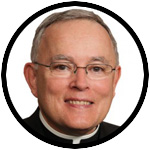I
IanM
Guest
Bishop Georg Bätzing, Chairman of the German Bishops’ Conference, is advocating a General Assembly of the Synod of Bishops after German church completes its Synod, calling for the ordination of women, blessings for divorced and ‘remarried’ and homosexual couples

 www.katholisch.de
www.katholisch.de
The following is an automatic translation to English of the article using the Chromium browser translation facility.
Should the original post word limit be exceeded, it will be concluded in subsequent post(s)
What happens after the Synodal Way? The DBK chairman has now spoken out in favor of a synod at world church level after the reform process in Germany has been completed. Bishop Georg Bätzing also explained at which points he sees room for church reforms - and where not.
The chairman of the German Bishops’ Conference (DBK), Bishop Georg Bätzing , spoke out in favor of an all-church synod in Rome, which deals with the decisions to be taken on the synodal path of the church in Germany . He was “very much in favor of transporting the knowledge and decisions that we collect on the Synodal Path - also with regard to women and ministry - to Rome,” said the Limburg bishop in an interview with Publik-Forum magazine (Friday). " What arises synodally must also be synodally clarified and answered," said Bätzing . This principle had been strengthened by Pope Francis.
When the woman was ordained a priest, Pope Francis, like his predecessors, emphasized that it was a “closed question”, continued Bätzing . " But that cannot mean that the question of the ordination of women is not discussed further." The demand for consecration for women is " there, in the middle of the church" . The arguments put forward by the magisterium against female priests “are often no longer accepted,” said the DBK chairman.
In addition, said Bätzing for church reforms such as from the approval of other Christians to the Eucharist . " Christians can choose with good arguments and according to their own conscience to take part in the Eucharist or Communion of the other denomination. " There is now a very high level of agreement among the Christian churches regarding the " meaning of what we believe and celebrate" he his position. Also the introduction of a blessing to remarried divorced and homosexual couples is conceivable for the DBK chairman. " Quite a few suffer from the fact that their relationship is not fully recognized by the church ." Those affected would wait for a “sign” from the church.
(Continued in subsequent post)

Nach Synodalem Weg: Bischof Bätzing spricht sich für Synode in Rom aus
DBK-Vorsitzender hält Segnung wiederverheirateter und homosexueller Paare für denkbar
The following is an automatic translation to English of the article using the Chromium browser translation facility.
Should the original post word limit be exceeded, it will be concluded in subsequent post(s)
By Synodal Way: Bishop Bätzing speaks in favor of the Synod in Rome
DBK Chairman advocates blessing of remarried and homosexual couplesWhat happens after the Synodal Way? The DBK chairman has now spoken out in favor of a synod at world church level after the reform process in Germany has been completed. Bishop Georg Bätzing also explained at which points he sees room for church reforms - and where not.
The chairman of the German Bishops’ Conference (DBK), Bishop Georg Bätzing , spoke out in favor of an all-church synod in Rome, which deals with the decisions to be taken on the synodal path of the church in Germany . He was “very much in favor of transporting the knowledge and decisions that we collect on the Synodal Path - also with regard to women and ministry - to Rome,” said the Limburg bishop in an interview with Publik-Forum magazine (Friday). " What arises synodally must also be synodally clarified and answered," said Bätzing . This principle had been strengthened by Pope Francis.
When the woman was ordained a priest, Pope Francis, like his predecessors, emphasized that it was a “closed question”, continued Bätzing . " But that cannot mean that the question of the ordination of women is not discussed further." The demand for consecration for women is " there, in the middle of the church" . The arguments put forward by the magisterium against female priests “are often no longer accepted,” said the DBK chairman.
In addition, said Bätzing for church reforms such as from the approval of other Christians to the Eucharist . " Christians can choose with good arguments and according to their own conscience to take part in the Eucharist or Communion of the other denomination. " There is now a very high level of agreement among the Christian churches regarding the " meaning of what we believe and celebrate" he his position. Also the introduction of a blessing to remarried divorced and homosexual couples is conceivable for the DBK chairman. " Quite a few suffer from the fact that their relationship is not fully recognized by the church ." Those affected would wait for a “sign” from the church.
(Continued in subsequent post)


